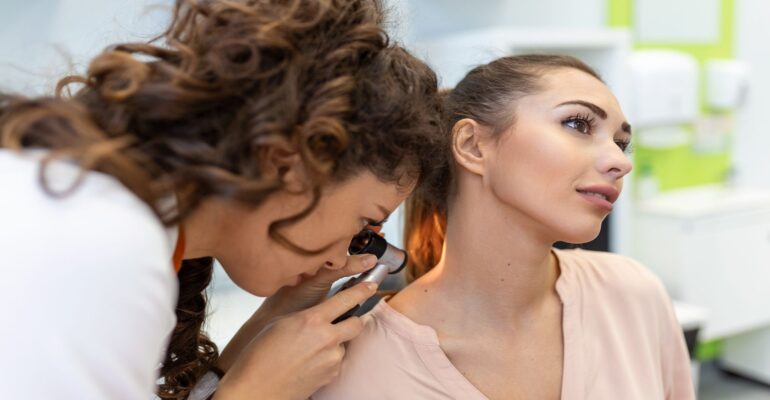When To See A Specialist For Skin Problems
August 26, 2022 2025-04-23 12:42When To See A Specialist For Skin Problems
As an Amazon associate, Dermatocare earns from valid purchase made by clicking on the affiliate links in this blog.

When To See A Specialist For Skin Problems
You’re likely to have a skin problem at some point in life, but you don’t need to see a specialist every time, as some may go away after a week or two. However, other skin conditions require professional treatment.
Figuring out the specialist you may need to visit can be tricky, especially when it’s urgent. You can seek just about any primary care for minor skin care problems, but you’ll need a skin specialist (dermatologist) for more severe skin problems.
Here are eight instances when you should see a specialist for skin problems:
Skin Infections
The skin is the largest body organ whose primary function is to guard your body against infections. However, there may come a time when the skin itself gets infected. Skin infections may result from germs like bacteria, fungus, viruses, or yeast, and the symptoms might be harsh or mild.
You know you’re infected once your skin starts discoloring, itching, or forming warts and pus. For mild infections, you can treat them with over-the-counter medications. When nothing changes, you’ll have to see a specialist. If you’re still unsure about this, visit dermatology websites for more information.
Skin Cancer Screening
Cancer screening is the act of ‘searching’ for cancerous cells before signs and symptoms appear. A skin cancer screening exam looks for unusual marks that may be a sign of cancer. While there’s no known cure, the spread will be contained and treated if noticed in its early stages.
You should visit your dermatologist for skin cancer screening from time to time to get an early diagnosis. Regardless of the type, skin cancer can be deadly if left unattended. So, if you experience symptoms like asymmetrical moles, skin growth, or more extensive lesions, go for a check-up immediately.

Spider And Varicose Veins
Varicose veins are the bulging or raised veins that may appear on your leg from time to time, while spider veins are the smaller counterparts that look like thin red or purple lines. Varicose veins result from increased blood pressure in veins near the skin’s surface. On the other hand, Spider veins occur when there’s a pool of blood near the skin’s surface and might result from trauma, obesity, heredity, or hormone level fluctuations.
These veins may cause aches from time to time and might be a symptom of a blood circulation problem. Your dermatology will guide you on the best methods you could use to treat such a condition.
Hair Fall
It’s natural to shed hair from time to time, but thinning hair and bald patches may be a sign of alopecia. Although there are different types of alopecia, areata is the leading cause of bald patches. Hair loss occurs when your hair follicles are mistakenly attacked and damaged by your immune system, resulting in weak hair. This condition affects everyone regardless of age and gender, and you must seek guidance from your dermatologist on treatment and diagnosis.
Skin Moles
A skin mole is a growth that may appear anywhere on your skin in groups or alone. Most people with this challenge are teenagers and young adults, but it may also appear to people of other age groups. Moles and skin tags aren’t pleasant to look at but may not entirely need medical treatment.
Some moles may slowly change, gaining different colors or becoming raised, with others disappearing over time. Hair may even grow in the mole. If you notice an unusual growth or color change, seek help from a specialist. Some may lead to skin cancer, and you don’t want to take that risk.
Skin Patches
Psoriasis may be signaled by flaky or dry, red skin patches appearing on your chest, elbow, knees, scalp, or even on your lower back. These patches can be very painful and itchy when left unattended. Regular skin check-ups, however, will help you detect and curb such complications as early as possible. Specialists treat such diseases with ointments, creams, and medication that relieve pain and itchiness.
Severe Acne
You may have had pimples or blackheads at some point that healed a few days after you sought the counter med. However, these remedies aren’t always the best choice for severe acne. Once you’ve tried all the medications offered by the local drugstore, and there are still no improvements, consider visiting a specialist.
Acne can scar your face and even lead to emotional distress. It’s more common in teenagers than adults, but it affects people of all ages, worsening every day if you don’t ask for help. Therefore, the earlier you seek medical attention, the better.
Conclusion
Some skin problems are common, requiring no medical attention as they tend to disappear with time. However, you may experience severe conditions, for which you’ll need a dermatologist’s help. Some may be a sign of a worse disease that needs treatment in its early stages. So, if you’ve experienced any of the mentioned conditions or any other skin imperfection you’re not sure about, don’t hesitate to seek help.
ROUTINE FINDER
Get free dermatologist-recommended regime by choosing your skin or concerns.

FACE

HAIRS

CHILD

BODY




